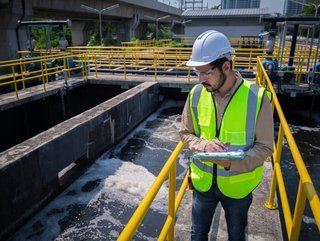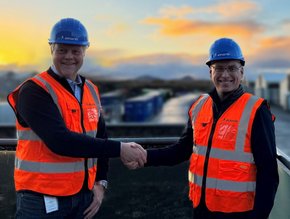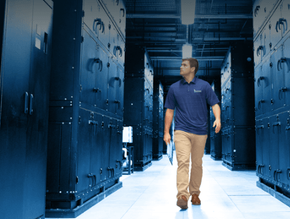Reclaimed wastewater to be used at 20 AWS locations

Data centres are notorious for their high water consumption, as they require extensive cooling systems to maintain optimal operating temperatures. Traditionally, data centres rely on potable water, which is treated to meet drinking water standards, however, this approach places a significant strain on freshwater resources, especially in water-scarce regions.
One company that is working towards the reduction of potable water usage by switching to purified wastewater is Amazon Web Services (AWS), by effectively turning waste into a valuable resource. Wastewater undergoes rigorous treatment processes to remove contaminants and ensure it meets the quality standards for data centre cooling. This not only reduces the demand for freshwater but also alleviates the burden on wastewater treatment plants.
Reclaimed wastewater to be used for cooling
Instead of relying on potable water for cooling purposes, Amazon has opted to use reclaimed wastewater (i.e., sewage) in a number of its data centres. This reclaimed wastewater undergoes a rigorous three-step treatment process that effectively removes 99% of impurities, rendering it suitable for data centre cooling.
The adoption of purified wastewater is part of AWS's broader sustainability strategy, which aims to minimise the company's environmental footprint. AWS has pledged to be water-positive by 2030, meaning that it will return more water to the environment than it consumes, with the use of purified wastewater representing a significant step towards achieving this goal.
“We want to be using recycled water whenever possible because that leaves cleaner, higher-quality water available for others,” Amazon water sustainability lead Will Hewes told SDxCentral.
Amazon has implemented this reclaimed wastewater treatment process in 16 data centres across Virginia and in Santa Clara, California facilities. The company's global network encompasses over 100 data centres, with numerous additional facilities under development.
Leading by example
By embracing sustainable water management practices, AWS is setting an example for other companies to follow, demonstrating that environmental responsibility can go hand in hand with technological innovation. The company unveiled a series of new water conservation initiatives, including the implementation of a cloud-based leak detection system across the local water infrastructure in Villanueva de Gallego, Spain, where AWS maintains data centre operations.
As previously mentioned by Google, the company claims to have been utilising reclaimed or non-potable water in over 25% of its data centre locations, including its facilities in Douglas County, Georgia. Google’s data centres consume an average of 450,000 gallons of water daily which is why the company has committed to replenishing 20% more water than it consumes by 2030.
Microsoft has joined Google in pledging to replenish more water than it uses by 2030. As detailed in its 2022 sustainability report, the company is actively using reclaimed water at its data centres in San Jose, California; Quincy, Washington; Texas; and Singapore.
Meta has also claimed it would be water-positive by 2030.
Apple has a history of using reclaimed water for its data centre operations in Oregon and while the company has not yet made a formal pledge to become water-positive, it is actively employing a "plant-based treatment method" to process cooling water at its data centres, thereby reducing the reliance on harsh chemicals.
Digital Realty has implemented an electrolytic descaling system in its Singapore data centre, which effectively prevents the accumulation of impurities and enables the water to circulate through the cooling system three times more frequently than before.
Although utterly crucial, data centres are major consumers of water, and as water scarcity becomes more apparent worldwide, it is essential to conserve this precious resource. By embracing a range of water conservation strategies, including the utilisation of reclaimed water, data centres can effectively reduce their reliance on freshwater and divert wastewater away from landfills and waterways. This approach will enable data centres to substantially reduce their water footprint and contribute to a more sustainable future.
******
For more insights into the world of Data Centre - check out the latest edition of Data Centre Magazine and be sure to follow us on LinkedIn & Twitter.
Other magazines that may be of interest - Mobile Magazine.
Please also check out our upcoming event - Sustainability LIVE Net Zero on 6 and 7 March 2024.
******
BizClik is a global provider of B2B digital media platforms that cover Executive Communities for CEOs, CFOs, CMOs, Sustainability leaders, Procurement & Supply Chain leaders, Technology & AI leaders, Cyber leaders, FinTech & InsurTech leaders as well as covering industries such as Manufacturing, Mining, Energy, EV, Construction, Healthcare and Food.
BizClik – based in London, Dubai, and New York – offers services such as content creation, advertising & sponsorship solutions, webinars & events.






